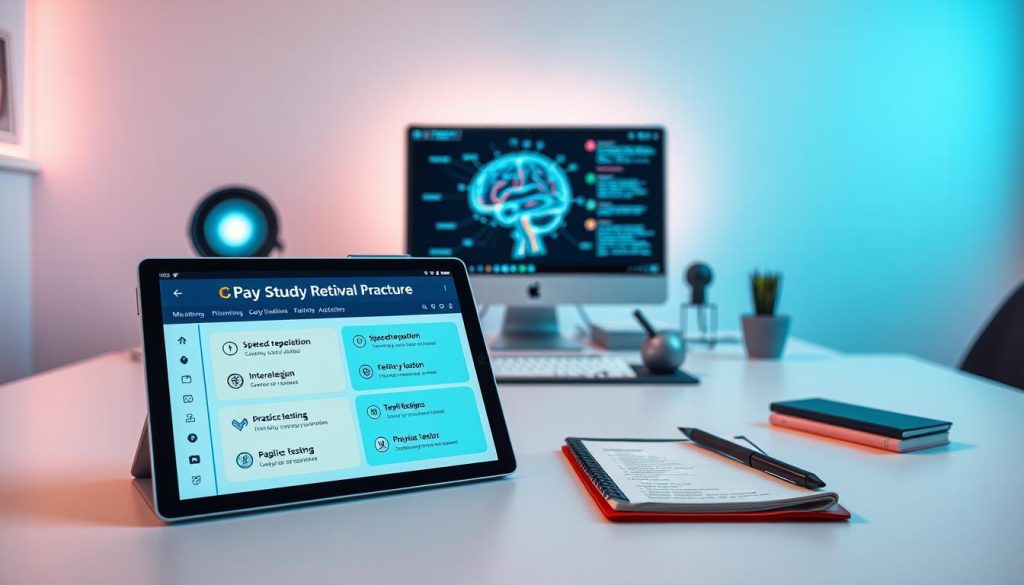Are you tired of studying without seeing real results? Retrieval Practice is here to change that! This powerful learning technique involves actively recalling information from memory. It’s not just about re-reading; it’s about truly learning.
Research by Karplice (2012) shows that “Retrieval-based learning: Active retrieval promotes meaningful learning.” This means using Retrieval Practice makes you study smarter, not harder. It’s an effective learning technique that boosts memory retention. This makes it easier to recall information when you need it.
Key Takeaways
- Boost your learning with Retrieval Practice
- Improve memory retention with active recall
- Study smarter, not harder
- Enhance your brain’s potential
- Transform studying into an enjoyable experience
The Science of Memory: Why Traditional Studying Falls Short
Studying the way we usually do isn’t as effective as we think. To understand why, we must explore how our brains handle information.
How Your Brain Forms and Retrieves Memories
Our brains are complex organs that store a lot of information. When we learn something new, it creates a neural pathway. The more we recall this information, the stronger the pathway gets.
As Karpicke (2012) noted, “Learning changes when we recall it. Every time we recall knowledge, it gets better for the next time.” This shows how crucial active recall is in learning.
The Problem with Passive Learning Methods
Passive learning methods, like rereading and highlighting, are common but not very effective. Let’s see why.
Rereading and Highlighting: Why They Don’t Work
Rereading and highlighting can make us think we know the material. We might feel we understand it after reading it many times. But, this doesn’t mean we can recall it when needed.
The Illusion of Knowledge Trap
Passive learning can lead to the “illusion of knowledge” trap. We think we know something because it’s familiar. But, we can’t really recall or use it.
To avoid this trap, we need to use better learning strategies. These should focus on active recall and memory retention.
What is Retrieval Practice? Understanding the Powerful Learning Technique
Retrieval practice is a method where you actively recall information from memory. It’s become popular because it boosts learning results. Tricia Taylor explains, “it’s about recalling what you learned before. This usually happens through low-stakes quizzes and checking if you got it right.”
Definition and Core Principles
At its heart, retrieval practice means actively working with what you’re trying to learn. Instead of just reading over notes, you test yourself. This makes it easier to remember the material later.
The Testing Effect: Scientific Evidence
Scientists have studied retrieval practice a lot, calling it the “testing effect.” They’ve found that testing or quizzing yourself improves memory more than just reading. This shows that active recall is better than passive study.
How Retrieval Practice Strengthens Neural Pathways
Retrieval practice does more than just help you remember. It also makes the connections in your brain stronger. This means you can recall information more easily in the future.
| Key Aspect | Description | Benefit |
|---|---|---|
| Active Recall | Testing yourself on material | Improved retention |
| Low-Stakes Quizzes | Regular, low-pressure tests | Reduced test anxiety |
| Neural Pathways | Strengthening connections between neurons | Easier future recall |
5 Transformative Benefits of Retrieval Practice
Retrieval practice is more than just a study technique. It’s a powerful tool that can change how you learn. By recalling information from memory, you’re not just remembering. You’re also getting better at using it in new ways.
Enhanced Long-Term Memory Retention
One key benefit of retrieval practice is better long-term memory. When you recall information, you’re more likely to remember it later. This is because it strengthens the connections in your brain. It makes it easier to find the information when you need it.
Improved Knowledge Application and Transfer
Retrieval practice does more than just help you remember facts. It also makes you better at using what you’ve learned in new situations. By practicing retrieval, you gain a deeper understanding. This makes it easier to apply your knowledge in different ways.
Reduced Test Anxiety Through Familiarity
Many students struggle with test anxiety. But retrieval practice can help by making you more familiar with the material. When you’re comfortable with the information, you’ll feel more confident. This reduces your anxiety during tests.
Metacognitive Awareness Development
Retrieval practice also boosts your metacognitive awareness. This means you can reflect on your own learning. By regularly practicing retrieval, you’ll know what you know and what you don’t. This helps you adjust your study plan.
Time-Efficient Learning and Study Sessions
Finally, retrieval practice makes your study time more valuable. By focusing on recalling information, you can see where you need to focus. This makes your study sessions more efficient and effective.
Getting Started: How to Implement Retrieval Practice Today
Now that we’ve looked at the benefits of retrieval practice, let’s get into how to use it. To do retrieval practice well, follow a few key steps. These steps can really improve how you learn.
Setting Up Your Optimal Learning Environment
Having the right place to study is very important. Your study area should help you focus and keep away from distractions.
Physical Space Considerations
Make sure your study spot is bright, quiet, and tidy. A clean space helps clear your mind. This makes it easier to focus on your studies.
Digital Environment Organization
Your digital space should be organized too. Use folders and labels to sort your study stuff. This makes it simpler to find what you need.

Creating a Sustainable Practice Schedule
Being regular with retrieval practice is crucial. Tricia Taylor advises teachers to “model the strategies” and “create short low-stakes quizzes based on previous content.” You can do the same by setting aside time each day or week for it.
Begin with short sessions and grow the time as you get better. It’s also key to keep it up and make it a regular part of your study routine.
Selecting Appropriate Study Materials
Picking the right study materials is essential for good retrieval practice. Flashcards, quizzes, and practice tests are great to start with. You can also find online resources or make your own based on your course.
“The key to successful retrieval practice is to actively recall information from memory rather than simply re-reading it.”
By following these steps and staying dedicated, you can fully use retrieval practice to boost your learning.
7 Powerful Retrieval Practice Techniques You Can Use Immediately
Now that we’ve looked at the science behind retrieval practice, let’s explore practical techniques you can start today. These methods are effective, easy to use, and fit many subjects and learning styles.
Flashcards: Creating and Using Them Effectively
Flashcards are a classic way to practice retrieval. Make cards with a question or term on one side and the answer or definition on the other. Quiz yourself by covering the answer side and trying to recall the information. Digital flashcard apps like Anki can also be incredibly useful, allowing you to sync your cards across devices and implement spaced repetition.
Free Recall: The Power of Blank Page Retrieval
Free recall means writing down everything you remember about a topic on a blank page. This technique strengthens your ability to recall information from memory without cues. Try it with a subject you’re studying, and you’ll be surprised at how much you can retain.
Self-Quizzing: Designing Your Own Tests
Self-quizzing is a powerful way to test your understanding and retention. Create practice quizzes with questions that challenge your knowledge. This active recall process helps solidify information in your long-term memory.
Concept Mapping from Memory
Concept mapping involves creating a visual representation of information, connecting related ideas and concepts. Try creating a concept map from memory to test your understanding of how different pieces of information relate to each other.
The Cornell Method with a Retrieval Twist
The Cornell Method is a note-taking system that can be adapted for retrieval practice. Divide your paper into sections, summarizing key points in one column and then testing yourself by recalling the information in another column.
Spaced Retrieval: Timing Your Practice Sessions
Spaced retrieval involves reviewing material at increasingly longer intervals to help solidify it in your long-term memory. Use a spaced repetition schedule to optimize your learning and retain information over time.
The Feynman Technique: Teaching to Learn
The Feynman Technique involves explaining a concept as if teaching it to someone else. This method helps you identify areas where you need more practice and reinforces your understanding. Try explaining a complex topic to a friend or family member to put this technique into practice.
By incorporating these seven retrieval practice techniques into your study routine, you’ll be well on your way to more effective learning and improved retention. Experiment with different methods to find what works best for you!
Digital Tools That Supercharge Your Retrieval Practice
Using digital tools can really help improve your retrieval practice. They make studying more efficient, fun, and effective.

Anki and Other Spaced Repetition Software
Anki is a top choice for spaced repetition software. It lets you make digital flashcards and review them at the best times. This helps information stick in your memory. Other great tools are SuperMemo and Mnemosyne.
- Anki: Highly customizable and supports various media types.
- SuperMemo: Known for its advanced algorithms and incremental reading feature.
- Mnemosyne: Open-source and designed for long-term memorization.
Quizlet and Alternative Flashcard Applications
Quizlet is a favorite flashcard app with many study modes. It’s perfect for making and studying digital flashcards. Other good options are Flashcards Deluxe and StudyStack.
- Quizlet: Offers a large user-generated content library and various study modes.
- Flashcards Deluxe: Feature-rich with card creation, audio, and image support.
- StudyStack: Allows for easy flashcard creation and sharing.
Note-Taking Apps with Built-in Retrieval Features
Some note-taking apps have features for retrieval practice. For example, Evernote and OneNote let you make digital flashcards. They help organize your notes for better recall.
- Evernote: Offers robust note organization and tagging.
- OneNote: Integrates well with other Microsoft Office tools.
How to Choose the Right Digital Tool for Your Needs
Choosing the right digital tool depends on your needs and preferences. Think about what you’re studying, the features you need, and if it works on your device.
- Consider the type of content you’re studying.
- Look for features that support your study goals.
- Check device compatibility.
Subject-Specific Retrieval Practice Strategies
Retrieval practice isn’t a one-size-fits-all technique; it can be tailored to suit various subjects, from mathematics to language learning. By adapting retrieval practice to the specific demands of your subject matter, you can maximize its effectiveness and enhance your learning experience.
Mathematics and Quantitative Subjects
For mathematics and quantitative subjects, retrieval practice can be particularly effective when focused on problem-solving skills. Instead of simply re-reading formulas or equations, try recreating them from memory.
Problem Generation vs. Problem Solving
One innovative approach is to practice generating your own problems. This technique not only tests your understanding of mathematical concepts but also helps you learn to apply them in different contexts.
| Subject | Retrieval Practice Technique | Benefits |
|---|---|---|
| Mathematics | Problem generation, formula recall | Improved problem-solving skills, better retention of formulas |
| Language Learning | Vocabulary quizzes, sentence construction | Enhanced vocabulary retention, improved grammar usage |
| History | Date recall, event summarization | Better retention of historical events, improved contextual understanding |
Language Learning and Vocabulary Acquisition
For language learners, retrieval practice can be a powerful tool for vocabulary acquisition. Using flashcards or quizzing yourself on word meanings can significantly improve your retention.
Historical Facts, Dates, and Concepts
When studying history, retrieval practice can help you remember key dates, events, and concepts. Try creating timelines or summarizing historical events from memory to reinforce your understanding.
Scientific Principles and Complex Processes
For science students, retrieval practice can involve explaining complex processes or principles in your own words. This technique helps solidify your understanding and improves your ability to apply scientific concepts to different scenarios.
By incorporating these subject-specific retrieval practice strategies into your study routine, you can optimize your learning and achieve better academic outcomes.
Overcoming Retrieval Practice Challenges
Retrieval practice comes with its own set of challenges. But knowing these challenges is the first step to beating them. As you start using this technique, you might face frustration, find active recall hard, and struggle to stay consistent. Yet, with the right approach, you can turn these challenges into chances for growth.
Managing Frustration When You Can’t Recall Information
Feeling frustrated when you can’t remember something is normal. Tricia Taylor says it’s okay to forget and that retrieval practice gets better with practice. To deal with frustration, set achievable goals and celebrate small wins. Remember, the journey is as valuable as the destination.
Dealing with the Difficulty of Active Recall
Active recall can be tough, especially if you’re used to passive learning. Start with simpler material and gradually make it harder. Use spaced repetition to review at the best times, making recall easier over time.
Maintaining Consistency in Your Practice
Consistency is crucial for effective retrieval practice. Make a sustainable practice schedule that fits your daily life. Even a few minutes each day can be more helpful than a long session once a week.
Tracking Progress and Staying Motivated
To stay motivated, track your progress and reflect on your growth. Use a journal or app to log your practice and note any improvements. Celebrate your achievements, no matter how small, to keep you engaged and motivated.
By understanding the challenges and using these strategies, you can overcome them. This way, retrieval practice can become a rewarding part of your learning journey.
Combining Retrieval Practice with Other Evidence-Based Learning Techniques
To get the most out of learning, mix retrieval practice with other proven methods. This blend can boost how well you remember and use what you learn. It makes learning more effective and fun.
Interleaving: Mixing Topics for Better Learning
Interleaving means switching between different learning materials or problems. It helps you understand things better. For example, studying history? Mix up your questions to cover different time periods.
Elaboration: Adding Meaning to What You Retrieve
Elaboration means adding more details to what you learn. This makes it easier to remember later. Try explaining what you’ve learned in your own words or think of real-life examples.
Dual Coding: Verbal and Visual Memory Enhancement
Dual coding uses words and pictures together. This method strengthens your memory. For example, make diagrams or mind maps to help remember what you’ve learned.
Concrete Examples: Making Abstract Concepts Stick
Concrete examples make hard-to-understand ideas easier to remember. When you practice recalling, think of real-life examples. This helps you understand and apply what you’ve learned better.
Using retrieval practice with these techniques can make learning more effective. Try different mixes to see what works best for you.
Conclusion: Transform Your Learning Journey with Retrieval Practice
Adding retrieval practice to your study routine can really boost your learning. We’ve looked into how it works, its advantages, and how to start using it.
Retrieval practice makes it easier to remember what you’ve learned. It’s not just about remembering facts; it’s about really understanding them.
Now, it’s your turn to make a change. Try out one or two methods that caught your interest. As you get better, you can try different ways to see what fits your learning style best.
The benefits of retrieval practice are clear. It helps you remember things for a long time, makes you better at using what you’ve learned, and lowers test anxiety. By making retrieval practice a regular part of your study, you’ll be on your way to reaching your learning goals.

